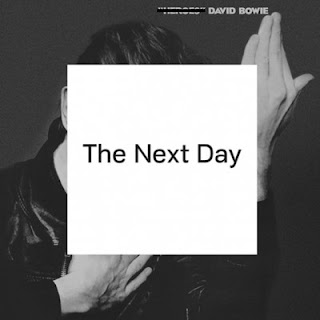David Bowie's new album The Next Day – his first for a decade – is a bold, beautiful and baffling electric bolt through its own mythos!
It is an enormous pleasure to report that the new David Bowie album is an absolute wonder: urgent, sharp-edged, bold, beautiful and baffling, an intellectually stimulating, emotionally charged, musically jagged, electric bolt through his own mythos and the mixed-up, celebrity-obsessed, war-torn world of the 21st century.
Musically, it is stripped and to the point, painted in the primal colours of
rock: hard
drums, fluid bass, fizzing guitars, shaded by splashes of keyboard and dirty
rasps of horns. The 14 songs are short and spiky, often contrasting that
kind of patent Bowie one-note declarative drawl with sweet bursts of melodic
escape that hit you like a sugar rush. Bowie’s return from a decade’s
absence feels very present, although full of sneaky backward glances.
Hints, references and echoes of the past abound. Touches of jangling Sixties
pop lift the flying melody of I’d Rather Be High, the poised soul of the
Thin White Duke haunts the sax strut of Dirty Boys and Boss of Me, and epic
Eighties Goth rears its imperious head amid the dramatic descending chords
of Love Is Lost.
You might detect the wonky sound-clashes of Berlin-era Bowie in the dissonant
chords of Dancing Out In Space, albeit crossed with the dynamic grooves of
Let’s Dance, opening out to the drum’n’bass jazz fusion of Earthling on If
You Can See Me.
There’s a surprising blast of the heavy rocking excess of Tin Machine on the
power-chord stomp of (You Will Set) The World On Fire and even a welcome
dash of Ziggy Stardust about the glam-rocking Valentine’s Day, which spirals
off towards the heavens with Earl Slick’s guitar solo pursuing the elusive
spirit of the late Mick Ronson.
